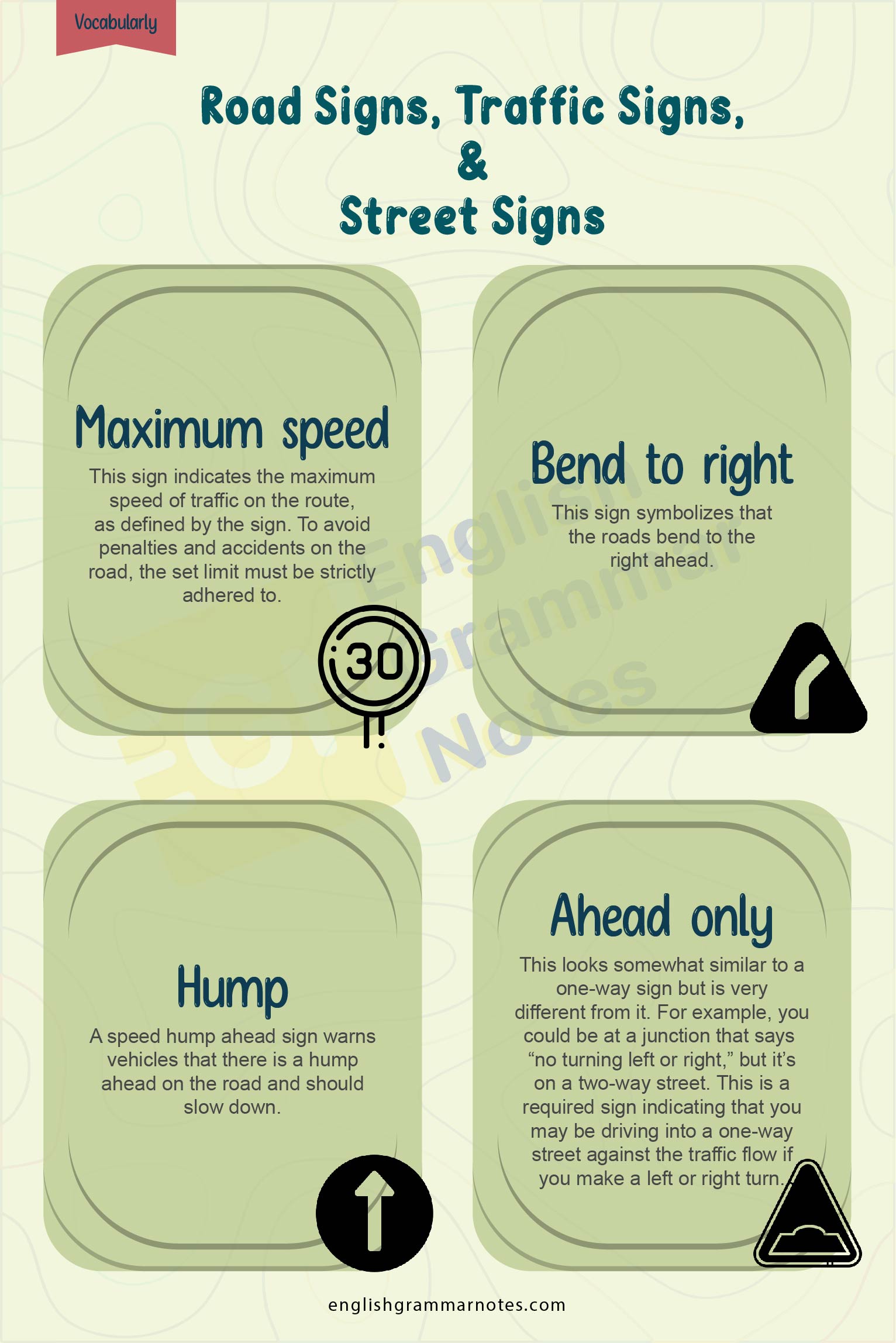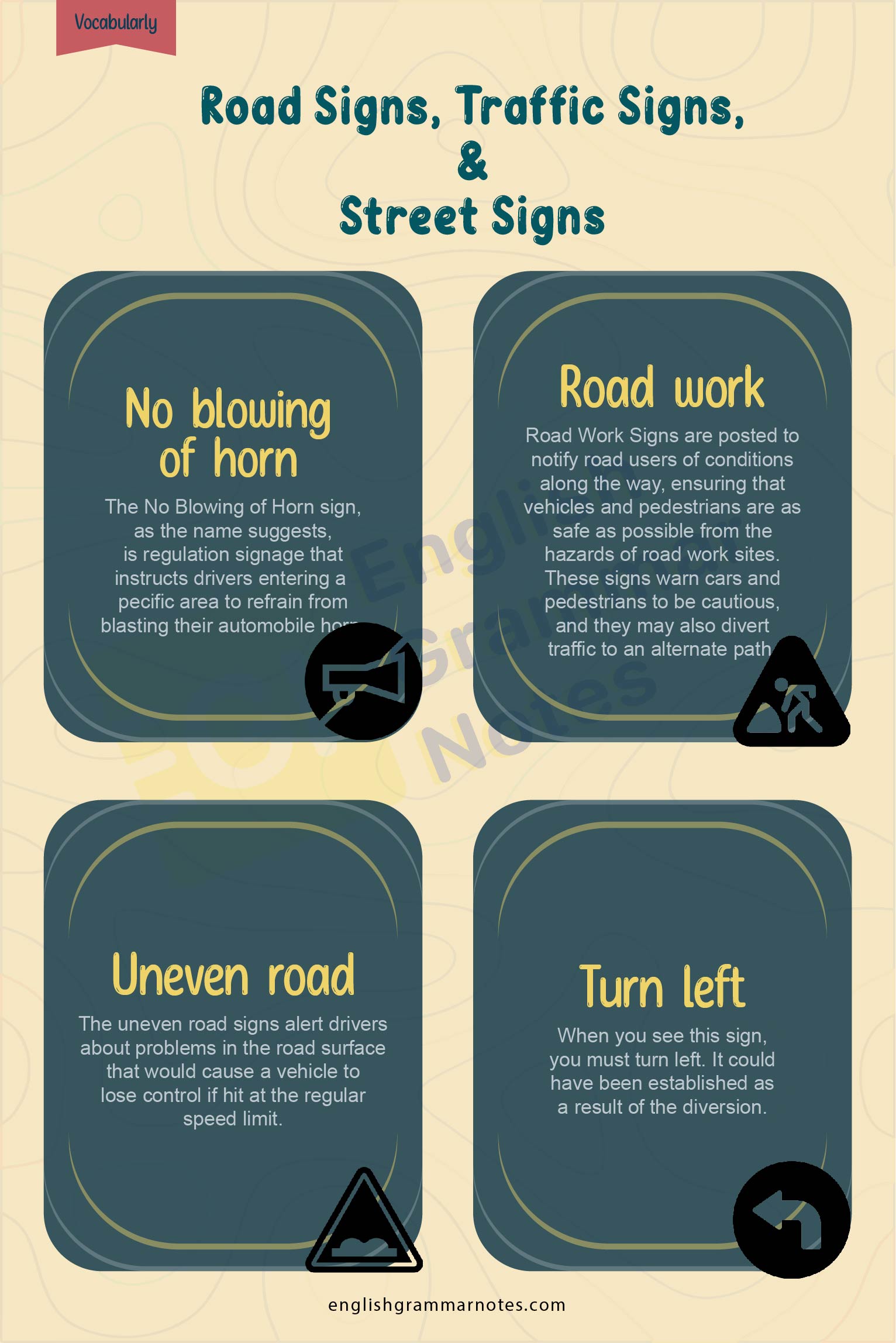Vocabulary Road Signs: You have just started driving, and it’s difficult for you to remember all the road and traffic signs. Well, do not worry, we have got you covered. It is essential for anyone who starts driving to know all these street signs before driving on the main roads or highways. So, here is a list of road signs, traffic signs, and street signs that will help you increase your knowledge about all the symbols you need to keep in mind while driving.
Study the most important English Vocabulary Words identified by our experts and learn the right vocabulary to use in your day to day conversations
List of Road Signs, Traffic Signs, and Street Signs Vocabulary words in English
- Name of Road Signs, Traffic Signs, and Street Signs Vocabulary words
- Description of the Road Signs, Traffic Signs, and Street Signs Vocabulary words.
Name of Road Signs, Traffic Signs, and Street Signs Vocabulary words
You must know that there are different types of road signs, some of which are very alike, but they are all different from each other. You must understand all the traffic signs with their meanings to avoid any form of trouble on the road.
List of Road Signs, Traffic, Signs, and Street Signs
- Ahead only
- Bend to right
- Crossroads ahead
- Dead end street
- Double bend
- Falling rocks
- Give priority to vehicles from opposite direction
- Give way
- Hump
- Maximum speed
- Minimum speed
- No blowing of horn
- No cycling
- No entry
- No left turn
- No motor vehicles
- No overtaking
- No stopping
- No U-turn
- No waiting
- One-way traffic
- Parking lot
- Pedestrian crossing ahead
- Priority over oncoming vehicles
- Road narrows on both sides
- Road work
- Roundabout
- Roundabout ahead
- School crossing
- Slippery road
- Stop and yield
- Traffic signs ahead
- Turn left
- Turn left ahead
- Two-way traffic ahead
- Uneven road
- Wild animals
Description of the Road Signs, Traffic Signs, and Street Signs Vocabulary words.
Ahead only
This looks somewhat similar to a one-way sign but is very different from it. For example, you could be at a junction that says “no turning left or right,” but it’s on a two-way street. This is a required sign indicating that you may be driving into a one-way street against the traffic flow if you make a left or right turn.
Bend to right
This sign symbolizes that the roads bend to the right ahead.
Crossroads ahead
A crossroads sign indicates an intersection ahead, with traffic arriving from the left, right, and straight ahead. Therefore, you must be prepared to stop to allow vehicles the right of way even if no traffic lights, stop signs, or give way signs are there.
Dead end street
Dead-end signs are placed at the beginning of a road or street to alert drivers that the path they are traveling leads to a dead-end or cul-de-sac.
Double bend
The double bend sign advises drivers that there is a bend in the road following the bend they can probably see ahead of them.
Falling rocks
This sign is placed when boulders are likely to fall on the road at any time of year. One can flip the symbol to reflect the expected side of rockfall.
Give priority to vehicles from opposite direction
As the sign states, it means that the driver must give priority to vehicles approaching from the opposite direction.
Give way
A give-way sign indicates that merging cars must be prepared to halt if necessary to allow another approach driver to proceed.
Hump
A speed hump ahead sign warns vehicles that there is a hump ahead on the road and should slow down.

Maximum speed
This sign indicates the maximum speed of traffic on the route, as defined by the sign. To avoid penalties and accidents on the road, the set limit must be strictly adhered to.
Minimum speed
This sign indicates the minimum speed of traffic on the route, as defined by the sign. To avoid penalties and accidents on the road, the set limit must be strictly adhered to.
No blowing of horn
The No Blowing of Horn sign, as the name suggests, is regulation signage that instructs drivers entering a specific area to refrain from blasting their automobile horn.
No cycling
Certain roadways designated for fast-moving automobiles are off-limits to cyclists to safeguard their safety. As a result, cyclists should avoid the routes where this notice has been posted.
No entry
No Entry is used on signs to signify that you are not permitted to enter a specific area or pass through a specific door or gate.
No left turn
This sign instructs drivers not to turn to the left under any circumstances.
No motor vehicles
This sign indicates that you cannot drive any motor vehicle down the road where this notice is visible. The space maybe only for pedestrians and bikes.
No overtaking
The no overtaking road sign is round with a red border, indicating issuing a directive to vehicles. It is forbidden to overtake because the no-overtaking sign is a regulatory sign.
No stopping
No stopping signs imply that you may not stop for any reason, including drop-off or pick-up of passengers, waiting for people to arrive, or loading or unloading merchandise.
No U-turn
This sign is used where cars are not permitted to turn in the opposite direction of travel between the sign and the next inter-section past it.
No waiting
This sign is used where cars are not permitted to turn in the opposite direction of travel between the sign and the next inter-section beyond it.
One-way traffic
The one-way traffic sign is a directional sign. Drivers who come across a one-way sign must proceed in the direction indicated by the sign. One-way signs indicate the direction in which traffic is moving.
Parking lot
Most people recognize the blue square with the white letter ‘P’ as free parking without time restrictions.
Pedestrian crossing ahead
This sign warns the driver to either slow down or stops to allow the pedestrian to cross the street. The road is also marked with white stripes known as zebra crossings.
Priority over oncoming vehicles
This sign indicates that your side has priority over traffic coming from the opposite direction. On narrow roadways, this will be employed.
Road narrows on both sides
The road narrows sign serves as a warning. Road narrows signs suggest that the road ahead will be narrower than the one you’re on now. This sign serves as a warning of potential hazards ahead, but no urgent action is required.
Road work
Road Work Signs are posted to notify road users of conditions along the way, ensuring that vehicles and pedestrians are as safe as possible from the hazards of road work sites. These signs warn cars and pedestrians to be cautious, and they may also divert traffic to an alternate path.
Roundabout
A Roundabout sign indicates that you are approaching a roundabout intersection, also known as a traffic circle, in which traffic circulates counterclockwise around a central island.
Roundabout ahead
Roundabout ahead signs warn vehicles that highways from multiple directions will merge ahead. As a result, drivers are more conscious and attentive to traffic.
School crossing
A pedestrian crossing where students cross a street on their way to school.
Slippery road
It is, in reality, a warning of a slick road, which could be caused by an oil spill or by monsoon rains. It encourages cars to slow down and be cautious as they pass by.
Stop and yield
A stop and yield or give way sign on the road warns that merging drivers must be ready to halt if necessary to let a driver on another route progress.
Traffic signs ahead
The traffic signal ahead warns the vehicle to slow down and prepare to come to a complete stop if the signal turns red.
Turn left
When you see this sign, you must turn left. It could have been established as a result of the diversion.

Turn left ahead
This traffic sign advises that all automobiles must turn left and that no other directions are permitted.
Two-way traffic ahead
This sign shows that you are exiting one-way streets and entering two-way streets. It also serves as a reminder to drivers that they are on a two-way street.
Uneven road
The uneven road signs alert drivers about problems in the road surface that would cause a vehicle to lose control if hit at the regular speed limit.
Wild animals
The Animal Crossing sign warns drivers that they are approaching an area where deer, elk, and other wildlife may cross the road.